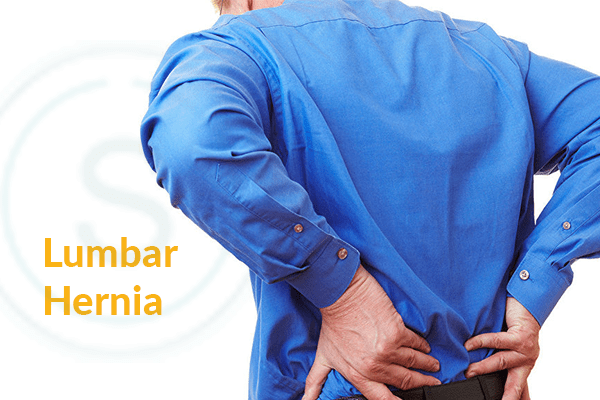The way you are sitting while working has a major impact on your posture. It causes lower back pain. But, is this pain making your daily life and work impossible? It can be a serious condition called lumbar hernia.
You might have heard about hernia in your groin or abdomen. But, do you know that hernia can also occur in the spine?
If your answer is No, Don’t worry. SMILES is here to help you to inform about the lumbar hernia.
What is Lumbar Hernia?
The abdominal wall protects the abdominal cavity, where the organs such as the stomach, kidneys and small intestine are located. A Flank hernia, also known as a lumbar hernia occurs due to the defects in the postero-lateral abdominal wall that allows the tissues inside the abdomen to protrude.
Most often, lumbar hernias are a result of the traumatic injury to the side or back of the abdominal wall. Lumbar hernias or flank hernias, typically occur in individuals aged 50 to 70 and are more common in men.
What causes a lumbar hernia?
In most cases, lumbar hernias are usually a result of blunt trauma to the abdominal wall. But, they can also occur due to the weakness in the abdominal muscles after a surgical incision. The tissues that were cut while making a surgical incision do not heal completely and forms a gap that leaves a patient susceptible to hernia formation.
Other factors that cause lumbar hernias are as follows:
- ● Older age (which makes the muscles weak and bones brittle).
- ● Lifting heavy weights that put extra strain on the lower back
- ● Being obese, as it puts added stress on the disks in the lower back.
- ● Sedentary lifestyle
- ● Repetitive strenuous activity
- ● Smoking, as it lessens the oxygen supply to the disk
What are the symptoms of a lumbar or a flank hernia?
Flank hernias are unnoticed in their early stages. However, some of the lumbar hernia symptoms include:
- ● Back pain and swelling around the area of the bulge.
- ● Abdominal cramping and tenderness.
- ● Numbness or a tingling sensation in the leg and foot.
- ● Weakness in the leg and foot
- ● Pain that worsens when coughing or straining.
- ● Sciatica, sharp pain and shooting pain that extends from the buttocks down to the back of one leg.
How is lumbar hernia treated?
For most of the patients, the herniated lumbar disc will gradually improve over a period of several days. But, some patients do experience episodes of pain and discomfort that require immediate medical attention – says Dr. Parameshwara, the best gastrointestinal surgeon in Bangalore. He also says that depends on the severity of the condition the treatment of lumbar hernia can be either nonsurgical or surgical.
Nonsurgical treatment
Initial treatment for the herniated lumbar disk is usually a nonsurgical treatment that focuses on pain relief. This treatment procedure includes:
- ● Rest: One to 2 days of bed rest will help relieve back pain. Avoid sitting for long periods make all your physical activity slow and controlled, especially lifting and bending forward.
- ● Physical therapy: Specific stretching exercises and massage will help strengthen your lower back and abdominal muscles.
- ● Non-steroidal anti-inflammatory medications(NSAIDs): Medications such as ibuprofen or naproxen helps relieve pain caused by herniated lumbar disc.
- ● Epidural steroid injection: An injection of a drug (like cortisone) into the around the nerve provides pain relief by reducing inflammation.
Surgical treatment
Only a few patients with lumbar hernia require surgery. This is recommended when the nonsurgical treatment has not relieved the painful symptoms of the herniated lumbar disc or for those who are experiencing muscle weakness and difficulty walking. Surgical treatment for a lumbar or flank hernia includes:
- ● Microdiscectomy: This procedure is done through a small incision at the level of the disk herniation that often requires the use of a microscope. It removes the damaged or protruded portion without removing the entire disc.
- ● Spinal fusion: A surgical procedure used to fix the problems in the bones of the spine (vertebrae).In this procedure, the surgeon fuses two or more vertebrae together so that they heal into a single bone.
The experts of hernia treatment explain that untreated lumbar hernias can grow to a bowel obstruction that makes bowel lose control. It can also lead to permanent damage to the spinal nerve.
Have you noticed the persistent symptoms of a lumbar hernia? Then Consult our hernia treatment specialists at SMILES who are capable of treating hernias in a pain-free manner.

